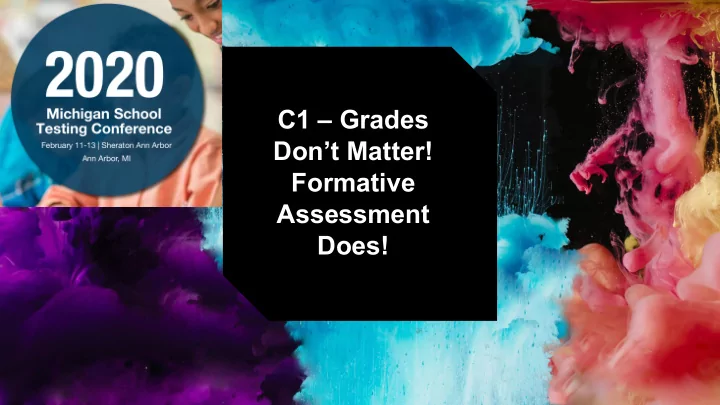

C1 – Grades Don’t Matter! Formative Assessment Does!
Will students learn without grades? Absolutely, if you believe it yourself and intentionally plan to make it happen . This session is designed to provide educators with strategies on how formative assessment can be used to motivate students to actively engage in learning without grades . Roy Sovis, Genesee Intermediate School District
Who’s in the audience? ● K-5 Teachers ● 6-8 Teachers ● HS Teachers ● CO Administrators ● Building Administrators ● Curriculum Directors ● Higher Ed ● “Psychometricians” 3 ● Other
@roysovis rsovis@geneseeisd.org Who Cares? ● Social Studies Summative ● ● Customized PD Assessment Roy Sovis ● MDE Standards Formative ● Writing Team Coordinator for Instruction Assessment ● MDE Standards PD Effective ● Development Team Grading Practices ● Youth Entrepreneurship Cognitive Coach ● Mentor ●
Session Agenda ● Purpose ● Clarify Language ● The Problems with Traditional Grading ● Using Formative Assessment to Improve Learning ● Next Steps and Resources
Provide evidence that formative ● assessment process can be used to motivate students to learn without grades Strategies on how to start using ● formative assessment to motivate students without grades
I can explain how components of the ● formative assessment process can be used to motivate students to learn without grades
What is your purpose for grading? Is my purpose for grading to select talent or develop it? - Thomas Guskey 2011 8
What is your purpose for grading? If to develop talent, then the main reason for grading should be to provide feedback to improve student and teacher performance. - Douglas Reeves 2016 9
Session Agenda ● Purpose ● Clarify Language ● The Problems with Traditional Grading ● Using Formative Assessment to Improve Learning ● Next Steps and Resources
Clarify Language - Mark or Score A number or letter given to any student test or performance that may contribute to the latter determination of a grade.* -Ken O’Connor, A Repair Kit for Grading: 15 Fixes for Broken Grades Based on criteria for performance
Clarify Language - Grade A number or letter reported at the end of period of time as a summary of student performance.* -Ken O’Connor, A Repair Kit for Grading: 15 Fixes for Broken Grades Based on criteria for performance
Clarify Language - Formative Assessment “Formative assessment is a planned, ongoing process used by all students and teachers during learning and teaching to elicit and use evidence of student learning to improve student understanding of intended disciplinary learning outcomes and support students to become more self-directed learners.” -CCSSO FAST SCASS, 2017
Session Agenda ● Purpose ● Clarify Language ● The Problems with Traditional Grading ● Using Formative Assessment to Improve Learning ● Next Steps and Resources
The Problems With Traditional Grading Refer to Dr. Guskey’s opening keynote and breakout session!
The Problems With Traditional Grading A private practice ● 100% scale is subjective ● ● Demotivating; Lacks incentive ● Perpetuates extrinsic motivation Reported grades lack meaning ● Source unknown
The Problems With Traditional Grading The final grade (letter or number) for a academic course should only ● be derived from summative student evidence of performance in reference to proficiency level indicators aligned to standards However, proficiency level indicators for a course take time to ● develop
The Problems With Traditional Grading ● Numerous challenges to change grading practices system wide Two entry points are promising… ● 1. Book study to start the conversation 2. Implement the formative assessment process
Effective Grading Practices
Using Formative Assessment to Improve Learning
Clarify Language - Formative Assessment “Formative assessment is a planned, ongoing process used by all students and teachers during learning and teaching to elicit and use evidence of student learning to improve student understanding of intended disciplinary learning outcomes and support students to become more self-directed learners.” -CCSSO FAST SCASS, 2017
Formative Assessment for Michigan Educators famemichigan.org/
Student evidence gathered during formative process is NEVER Graded! This starts the conversation about grading and how to change.
Strategy Five Steps to Motivate Students to Mastery -ASCD Express Article 1. Select high stakes summative assessment 2. Introduce new system: No homework, assignments not graded 3. Explain final grade summative assessment only 4. Explain related learning opportunities (assignments) 5. Explain all learning opportunities receive feedback, but no grade 25
Components of GISD 4 Day FA Institute ● Overview ● Planning ● Learning Target Use ● Activating PK ● Gathering Evidence ● Questioning ● Feedback ● Peer Assessment ● Self-Assessment ● Making Instructional Decisions
What do students say about doing work that receives feedback, but no grade? 27
Summary Using Formative Assessment to Motivate Without Grades 1. Book study to start conversation 2. Learn FA; begin implementation; FAME Project 3. Only give descriptive feedback on all assignments with no grades 28
29
Roy Sovis rsovis@geneseeisd.org @roysovis 810-591-4520
Recommend
More recommend